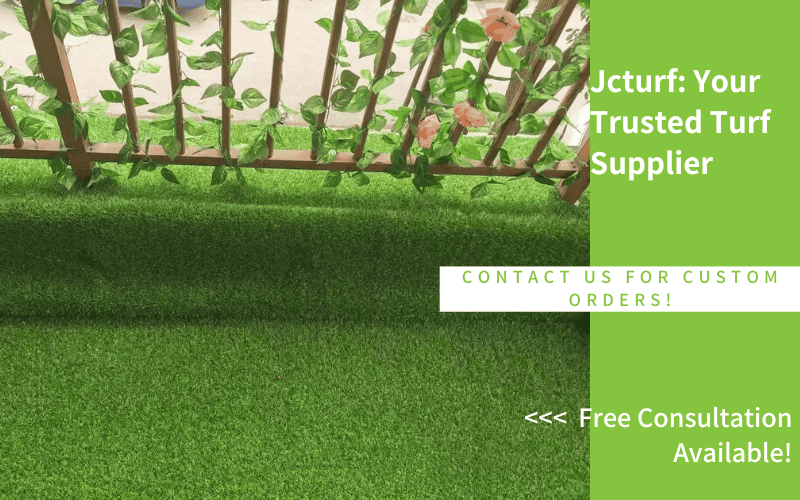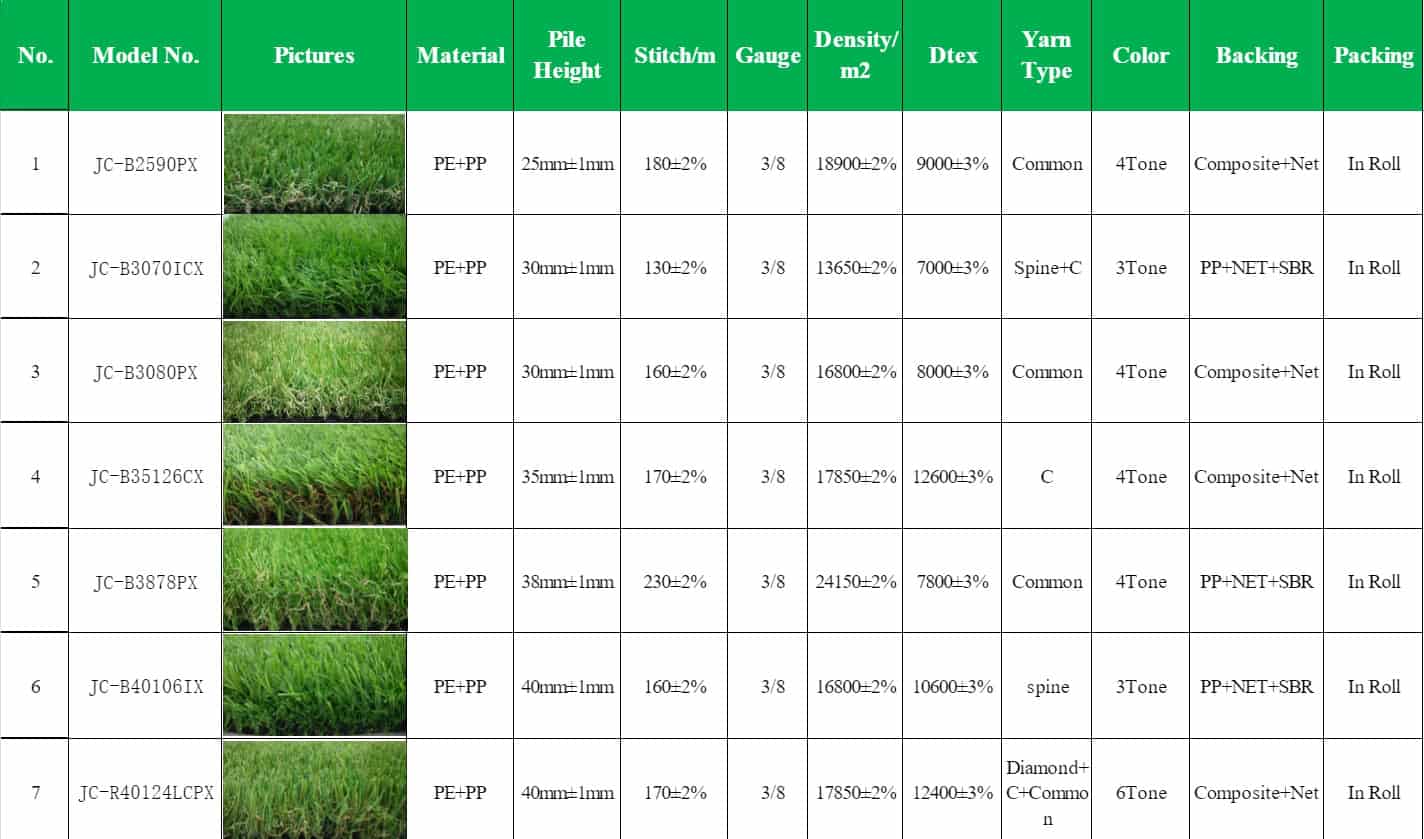No — current research has not proven that artificial turf causes cancer.
But concerns aren’t unfounded. Some low-quality products and certain infill materials, like crumb rubber from recycled tires, can contain chemicals linked to health risks if not properly tested.
If you’ve ever worried about your child playing soccer on a synthetic field, or your dog running across artificial grass in your backyard, you’re not alone. News headlines about cancer risk, environmental bans, and “toxic turf” have left parents, schools, and sports clubs asking: Is artificial turf really safe?
In this article, we’ll look at what current research says about artificial turf and health, outline the key risk factors to be aware of, and share practical tips on how to choose safer products. We’ll also show how JCturf, as an experienced artificial turf supplier and manufacturer, offers safety-focused options — including PFAS-free turf — for schools, sports facilities, and landscaping projects.
Is Artificial Turf a Health Hazard?
Quick Answer: No — current evidence does not prove that artificial turf is a health hazard.
Most scientific studies — including those by the U.S. Environmental Protection Agency (EPA), the European Chemicals Agency (ECHA), and the Washington State Department of Health — have found no clear proof that playing on compliant, well-manufactured artificial turf increases cancer risk. However, not all turf is created equal, and low-quality products or certain infill materials can still carry health concerns if they contain higher levels of harmful substances.
What’s Been Found in Turf and Infill
Testing has detected small amounts of:
- Polycyclic aromatic hydrocarbons (PAHs)
- Heavy metals like lead and zinc
- Volatile organic compounds (VOCs)
In certified, high-quality turf, these remain well below international safety limits. Still, some substances — such as PFAS — are under ongoing review, and long-term exposure data is limited.
Is Artificial Turf Bad for Animals?
Not if it’s made from safe, certified materials.
High-quality, PFAS-free, and non-toxic artificial turf is generally safe for animals. However, poorly manufactured turf or infill materials with high levels of harmful chemicals can pose health risks to pets and wildlife. These risks typically come from ingesting loose particles, licking chemical residues, or exposure to extreme surface heat.
Is Artificial Turf Toxic to Dogs?
No — compliant artificial turf is not toxic to dogs.
Products that meet strict safety standards, verified by third-party testing, contain levels of PAHs, heavy metals, and VOCs that are well below limits known to cause harm. The main concern for dog owners is when pets chew or swallow infill particles — especially crumb rubber from recycled tires — or lick residues from low-quality turf. To minimize risks, choose PFAS-free, non-toxic artificial grass and monitor pets during play.
Does Artificial Turf Cause Cancer in Dogs?
No — there is no scientific evidence that artificial turf causes cancer in dogs.
To date, studies have not established a direct link between dogs playing on artificial turf and developing cancer. While certain chemicals found in low-quality turf could be harmful in high concentrations, the levels in certified, well-made products are considered safe. The greater risk lies in chronic exposure to toxic materials from inferior turf, so the safest approach is to use tested, non-toxic, PFAS-free turf from reputable suppliers, like JCturf.
Is Artificial Turf Worse Than Grass?
Not necessarily — it depends on what you value most.
Natural grass and artificial turf each have their own advantages and drawbacks, and the “better or worse” question depends on factors like climate, maintenance budget, and health priorities.
Natural Grass
- Cooler Surface: Natural grass stays cooler under direct sunlight, making it more comfortable for people and animals.
- Biodegradable: It naturally decomposes, posing no long-term waste issues.
- Maintenance & Climate Limitations: Requires regular mowing, watering, fertilizing, and can be difficult to maintain in dry or extreme climates.
Artificial Turf
- Durability & Year-Round Use: Synthetic turf stays green all year and withstands heavy use, even in harsh climates where natural grass struggles.
- Lower Maintenance: No watering, mowing, or fertilizing required, reducing long-term upkeep costs.
- Potential Concerns: Can get 20–30°C hotter than natural grass in direct sun and, if poorly made, may contain chemicals like PAHs, heavy metals, or PFAS.
Best of Both Worlds
Choosing a PFAS-free artificial turf from JCturf that meets strict safety standards allows you to enjoy the durability and low maintenance of synthetic turf while minimizing potential health and environmental concerns.
Advantages & Disadvantages of Artificial Turf
| Advantages | Disadvantages |
| Year-round durability — stays green and usable in all seasons, even in harsh climates. | Possible chemical content — some products may contain PFAS, PAHs, heavy metals, or VOCs (choose PFAS-free artificial turf for safety). |
| Low maintenance — no mowing, watering, or fertilizing required. | Higher surface temperatures — can be 20–30°C hotter than natural grass, increasing the risk of heat stress. |
| Cost savings over time — reduced water bills and maintenance expenses. | Not biodegradable — disposal and recycling are costly and complex. |
| Consistent playing surface — ideal for sports fields with heavy use. | Environmental impact — production and disposal can generate waste and microplastics. |
| Weather resistance — playable shortly after rain and unaffected by drought. | Potential injury concerns — higher risk of turf burns and abrasions compared to natural grass. |
How to Minimize Artificial Turf Health Risks
While high-quality artificial turf is generally considered safe, taking a few extra precautions can further reduce potential health risks for people, pets, and the environment.
Choose products with third-party testing: Ensure the turf has been independently tested for PAHs, heavy metals, VOCs, and PFAS to verify compliance with international safety standards.
Request a full Material Declaration: Know exactly what materials are used in the turf fibers, backing, and infill to avoid hidden chemical risks.
Prioritize safe alternative infills: Consider options like TPE, EPDM, or organic infills (such as cork or coconut fiber) instead of crumb rubber from recycled tires.
Maintain and clean regularly: Proper upkeep helps reduce dust, microplastics, and particle exposure for players, children, and pets.
Is there any artificial grass that isn’t toxic?
The answer is yes — but the key is to select products with clear safety information and responsible sourcing. When purchasing artificial turf, it’s worth taking a few steps to ensure you’re selecting a safe and suitable product for your needs:
- Ask for and review safety documentation where available — This may include test reports showing levels of PAHs, PFAS, heavy metals, and VOCs.
- Check the supplier’s compliance credentials — Look for evidence that materials and manufacturing follow recognized international guidelines.
- Consider low-risk or non-toxic infill options — Such as TPE, EPDM, or organic infills instead of crumb rubber from recycled tires.
- For high-use environments like schools and sports fields — Explore solutions, such as JCturf’s safety-focused product lines, that are designed with durability, performance, and minimized health risks in mind.
Artificial Turf Supplier & Manufacturer You Can Trust
While current research has found no conclusive evidence that artificial turf significantly increases cancer risk, the safety of any installation depends on the quality of materials and strict manufacturing standards.
As a professional artificial turf supplier and manufacturer, JCturf is dedicated to producing durable, performance-driven, and safety-focused turf solutions. Our product range — including PFAS-free options — is designed to meet the needs of schools, sports clubs, municipalities, and commercial projects worldwide.
Whether you require a large-scale sports field turf, a safe playground artificial grass, or a premium landscaping turf solution, we can work with you to create a customized turf system that balances performance, safety, and long-term value. Partner with JCturf and ensure your field or facility is built on a safe, reliable foundation.


